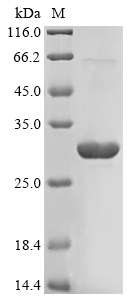The recombinant human PYCARD protein is encoded by a recombinant DNA that was cloned into the expression vector and then transformed into the E.coli that supports the expression of the gene. The recombinant DNA was constructed by fusing the N-terminal 10xHis tag and C-terminal Myc tag gene to the gene fragment coding for the 1-195aa of the human PYCARD protein. After purification, the product is the recombinant human PYCARD protein. This recombinant PYCARD protein was subjected to the SDS-PAGE determination. Its purity reaches over 85% evaluated by Bandscan software analysis combined with SAS-PAGE. This recombinat PYCARD protein may have applications in cancer research.
PYCARD protein contains an N-terminal PYRIN-PAAD-DAPIN domain and a C-terminal caspase-recruitment domain. PYCARD has been found to mediate inflammatory and apoptotic signaling pathways via the activation of caspase. In normal cells, PYCARD expression is found on cytoplasm. PYCARD comes in four different isoforms (1-4). The four kinds of isoforms are related to different biological process. Recent studies identified that aberrant hypermethylation-mediated suppression of PYCARD is extremely frequent in prostate cancer. In addition, the critical role for PYCARD has been found in the development of experimental autoimmune encephalomyelitis.




